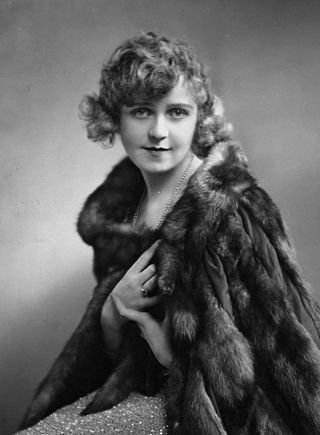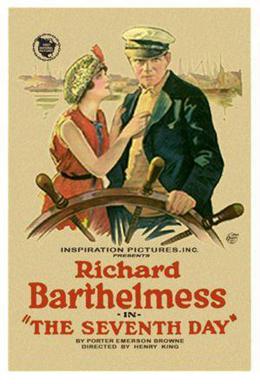
Robert Roy MacGregor was a Scottish outlaw, who later became a folk hero.

Marie Ault was a British character actress of stage and film.

Betty Balfour was an English screen actress, popular during the silent era, and known as the "British Mary Pickford" and "Britain's Queen of Happiness". She was best known to audiences for her Squibs series of films.

Quartet is a 1948 British anthology film with four segments, each based on a story by W. Somerset Maugham. The author appears at the start and end of the movie to introduce the stories and comment about his writing career. It was successful enough to produce two sequels, Trio (1950) and Encore (1951), and popularised the compendium film format, leading to films such as O. Henry's Full House in 1952.

Leonora Mary Johnson, known professionally as Nora Swinburne, was an English actress who appeared in many British films.

My Old Dutch is a 1934 British drama film directed by Sinclair Hill and starring Betty Balfour, Gordon Harker, Michael Hogan and Florrie Forde. The film portrays the lives of Londoners during the First World War. The film was made at Islington Studios by Gainsborough Pictures. The film's sets were designed by Peter Proud. Bryan Edgar Wallace contributed to the screenplay, adapted from the stage play written by Arthur Shirley and also based on Albert Chevalier's famous song.

The Farmer's Wife is a 1941 British comedy drama film directed by Norman Lee and Leslie Arliss and starring Basil Sydney, Wilfrid Lawson and Nora Swinburne. It is based on the play The Farmer's Wife by Eden Phillpotts which had previously been adapted by Alfred Hitchcock for a 1928 film of the same name. It was produced by ABPC at Welwyn Studios, at a time when the company's main Elstree Studios had been requisitioned for wartime use. The film is not widely known.

Potiphar's Wife is a 1931 British romance film directed by Maurice Elvey and starring Nora Swinburne, Laurence Olivier and Guy Newall. It is also known as Her Strange Desire. It was based on a play by Edgar C. Middleton.
A Light Woman is a 1928 British silent romance film directed by Adrian Brunel and starring Benita Hume, C. M. Hallard and Gerald Ames. It is also known by the alternative title Dolores. The screenplay concerns a flighty young woman who learns the error of her ways through a series of love affairs.
The Autumn of Pride is a 1921 British silent romance film directed by W. P. Kellino and starring Nora Swinburne, David Hawthorne and Mary Dibley. It was an adaptation of a novel by E. Newton Bungay.

Bryan Gilbert Powley was a British stage and film actor. He began his career in the era of silent film.
His Grace Gives Notice is a 1924 British silent comedy film directed by W. P. Kellino and starring Nora Swinburne, Henry Victor and John Stuart. It is an adaptation of the 1922 novel His Grace Gives Notice by Laura Troubridge. A sound adaptation was made in 1933.
Donald Frederick Macardle was an Irish film and stage actor and writer. He also directed the 1933 film The King's Cup.

Lady Frances Balfour was a British aristocrat, author, and suffragist. She was one of the highest-ranking members of the British aristocracy to assume a leadership role in the Women's suffrage campaign in the United Kingdom. Balfour was a member of the executive committee of the National Society for Women's Suffrage from 1896 to 1919. As a non-violent suffragist, she was opposed to the militant actions of the Women's Social and Political Union, whose members were called the suffragettes.

The Loves of Mary, Queen of Scots is a 1923 British silent historical film directed by Denison Clift and starring Fay Compton, Gerald Ames and Ivan Samson. The film depicts the life of Mary, Queen of Scots, and her eventual execution. It was one of the final films made by Ideal, one of the leading British studios, before they were hit by the Slump of 1924.

Blinkeyes is a 1926 British silent drama film directed by George Pearson and starring Betty Balfour, Tom Douglas, and Frank Stanmore.
Hornet's Nest is a 1923 British silent drama film directed by Walter West and starring Florence Turner, Fred Wright, and Nora Swinburne.
Jury's Evidence is a 1936 British crime film directed by Ralph Ince and starring Hartley Power, Margaret Lockwood and Nora Swinburne. It was made at Beaconsfield Studios. It was an early role for Margaret Lockwood.

The Seventh Day is a 1922 American silent drama film directed by Henry King and starring Richard Barthelmess, Louise Huff, Frank Losee and Anne Cornwall. A group of high society New Yorkers on a yachting vacation put into a small New England fishing village for repairs. While there they strike up relationships with locals that threaten the harmony of their party.

Wee Macgreegor is a character created in newspaper short stories and books written by the Scottish journalist and author, John Joy Bell, first appearing in the Glasgow Evening Times in 1901. Initially, he was a cheeky young boy with an insatiable fondness for sweets, the son of respectable working class parents, Lizzie and John Robinson, who lived in Glasgow. Reported speech in the stories is written in the Glasgow dialect. Later books covered Wee Macgreegor's adolescence and enlistment during the First World War.













